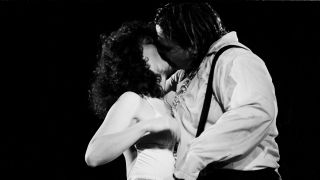"We started out getting booed off the stage.”
It was the spring of 1977. Drummer Joe Stefko was 20 years old, yet already he was no stranger to weird gigs. Prior to this one, he’d played with former Velvet Underground bassist/keyboardist/violist John Cale on a UK tour that ended, for him, when Cale killed a chicken on stage.
Just a few months later he was part of the Bat Out Of Hell touring band, the most implausible rock’n’roll circus imaginable. At the centre of it all was Jim Steinman, an eccentric lyricist, composer and heavy metal piano player from New York who was obsessed with car-crash songs and high drama. Also on board were Karla Devito, a bubbly brunette backing singer with massive pipes and a heart-rending smile, a two- brother team of hot-shot rock guitarists, Bruce and Bob Kulick, and, up front, a 350-pound man-monster from Texas stuffed into a cheap tuxedo.
The fittingly named Meat Loaf was an aspiring actor with a voracious appetite for life, destruction and whatever else came his way. Meat could sing, in a big, booming voice that rattled the roof of the biggest arenas. The songs Steinman wrote for him were epics; 10-minute mini-operas filled with breathless tales of teenage lust and last-minute redemption that rumbled and throbbed like demonic speed machines. As Steinman said in the illuminating 1999 documentary Classic Albums: Bat Out of Hell: “They were all motorcycle rock songs. Even the ballads were motorcycle rock ballads.”
Those songs had originally found a home on Meat Loaf’s monstrous Bat Out of Hell album, produced by Todd Rundgren and recorded with musicians that included members of Rundgren’s band Utopia and Bruce Springteen’s E Street Band. Released in October 1977, it would eventually sell 37 million copies. But in that frosty October, amid the clamour of punk and the pulse of disco, the world just shrugged. So Meat and Jim assembled a crack band and hit the road, determined to ride their unwieldy beast to the top.
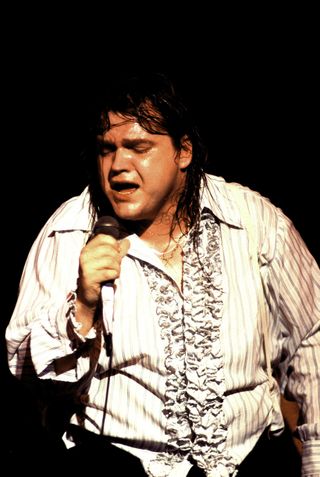
In the beginning it was a very bumpy ride. The Bat Out Of Hell tour began at a club in Chicago shortly after the album was released. Meat Loaf and co. were opening for Cheap Trick. It did not go well.
“We were all dressed in weird outfits. The main thing I remember is they started the show off with speeches, not music, and that was wrong,” Stefko recalls of that first show.
“Bob Kulick and myself were trying to tell them: ‘We really don’t think this is how we should start the show. They’re not gonna get it’. And we kinda got, you know: ‘Shut up. We’re from Broadway, we know how to put on a show’. Yeah, I thought, but this is rock’n’roll. And then the booing started.”
“Meat was so upset he destroyed the dressing room,” Stefko says of that night. “Chairs were going… And Bob, who never took shit from anybody, said: ‘I told you this was not gonna work!’. He said: ‘Don’t you ever embarrass me like that again!’. And Meat just starting throwing shit all over the place. So we all had a meeting afterwards, and I remember saying: ‘Look, you’ve gotta punch them in the face right away. You’ve gotta get the first punch in and just shut ’em up. Show them how great you are, and then you can do your speeches and your balloon acts or whatever the fuck you want to do’. So we retooled the show. We never opened for anyone again, either.”
They didn’t have to. After struggling with a minuscule budget and hampered by insufficient promotion from the record label, Meat Loaf played the CBS Records convention in New Orleans in the winter of 1977, and their now legendary performance changed everything. “We blew away everybody down in New Orleans,” Bruce Kulick says. “After that the label ‘got it’, and they committed a lot of money, and it was a much, much better tour after that.”
In Meat Loaf’s 1999 autobiography To Hell And Back, the singer writes about the intensity of that CBS Records convention gig: “There must have been 200 people on stage while the band was still playing. We were that stunned. People were jumping and dancing and carrying on. They went crazy, completely berserk. They did something like $40,000 worth of damage to the room… That night set the wheels in motion. Whether they hated Bat Out Of Hell with a passion or not, they finally got behind it.”
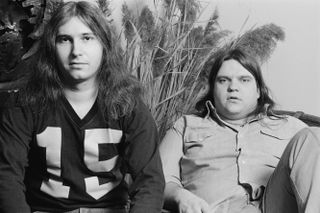
Within months the band had moved from clubs to theatres, and then to arenas and civic centres. They conquered the US, and then set their sights on the UK and Australia, where they became ever bigger. By May 1978, when the tour lurched to a halt, Meat Loaf was one of the most recognisable acts in the world.
The tour was also one of the most volatile. There were fights, mutinies, drugs and over-indulgence at every stop. Meat pushed himself so hard physically every night that he required oxygen to revive him – an iconic image that would become a symbol for 70s excess. The injuries and madness mounted, climaxing in Meat’s dramatic, bone-breaking tumble off stage in Ottawa, and a bizarre, public suicide attempt soon after.
“None of it surprised me,” Joe Stefko says. “None of it. It wasn’t like: ‘Gee, look, we’re doing coliseums’, it was like: ‘Yeah, that’s where this belongs’. We knew where it was gonna go. I was never surprised when it got bigger and bigger and crazier and crazier. It was so fuckin’ obvious.”
It should be pointed out that the circus didn’t end in 1978. Even just writing about the Bat Out Of Hell tour 30 years later is a monumental task. While his ex-band members were readily available to talk, Meat Loaf himself proved elusive, scheduling and cancelling interview dates three times. And then, just a week before this story was due, he announced on stage at a show in Newcastle that he “would never sing again”, due to recurring voice problems. His management said he was just stressed, but at the time of writing he hasn’t played a gig since.
He cancelled an appearance at the 2007 Classic Rock Roll Of Honour (on the day of the event), and then cancelled the rest of his European tour. Days before that, supposedly because he was ‘resting his voice’, he placed a moratorium on phone interviews, leaving this writer with merely a few lines of tersely written emailed answers to run with. Karla Devito, Meat’s forever chirpy foil on the original Bat tour, is not surprised. “He’s a tortured guy,” she laughs. “There’s no doubt about that.”
Karla was hired not just as a backing singer, but also as an actress as well. She played the virginal teenage temptress to Meat’s revved-up horn-dog in Paradise By the Dashboard Light, a campy rock’n’roll fantasy that required the apple-cheeked singer to lock lips with the amorous Meat in a nightly on-stage tryst. Karla jokes that making out with Meat was not on her job description when she took the gig.
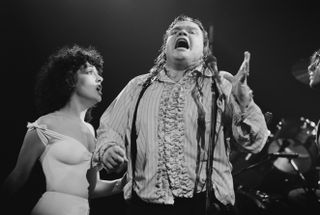
“I said to Steinman: ‘Exactly what happens in Paradise?’. And he goes: ‘You’ll figure it out when you get there’. So, swear to God, literally, we had not rehearsed the make-out scene until we performed it live. It was just improvisational theatre out there.”
Eventually the skit became the centre-piece of the show, and it got wilder as the tour wore on. In the Classic Albums documentary, Steinman said:
“Karla had one of the most difficult jobs in the world. I remember her saying: ‘I can’t believe how far down my throat he gets his tongue. It doesn’t seem possible. It’s like he’s doing a stomach X-ray with his tongue!’.”
At times the act got even more physical. “There was one time I came up earlier in the song than I normally would, and this giant heavy steel mic stand bottom whizzed by my head within an inch,” Karla says. “I didn’t realise that every night at that point in the show he threw that at me!”
“That girl went through hell with that song,” says Joe Stefko. “Meat threw her once. Not on purpose, but he threw her off the stage. Meat was one of those guys, when he was in character he was not himself any longer. I always believed that if you tapped him on the shoulder and asked him his social security number at that moment, he wouldn’t know it.”
Despite the occasional real-life near-miss, the Paradise… riff illuminated what Bat Out Of Hell really was: a darkly comic wish-fulfilment fantasy about the chubby everyman who not only gets the prettiest girl in school, but also even gets to flat-out reject her. It was like Flight Of The Valkyries meets American Graffiti. With motorcycles! And finally, there was a rock’n’roll singer who the average man-on-the-street could relate to.
Prior to the Bat Out Of Hell record, Meat Loaf’s main claim to fame was his portrayal, on stage and in the movie of the same name lauded by students everywhere, of undead rock star Eddie in The Rocky Horror Show. Meat took the same intensity with him on the tour, and performed with almost inhuman energy, regardless of the circumstances.
“I know the pain that will come when I walk on that stage, from what I am about to give of myself to that audience,” Meat writes in his email. “In the words of Sally Fields: ‘When you give everything you have to give in a performance, it is like cutting yourself with razor-blades’.”
That kind of pain, well, it’s certain to take its toll.
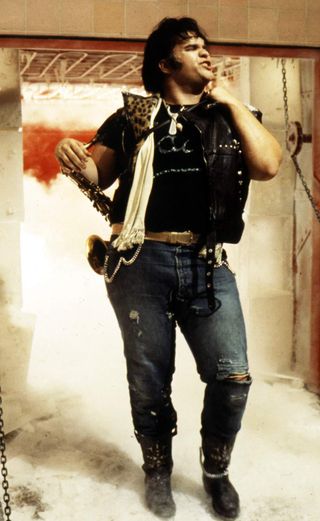
- Meat Loaf: “I'm not afraid of anybody!”
- Def Leppard: How we made Hysteria
- Meat Loaf albums ranked from worst to best
“I wasn’t aware that Meat was doing any sort of illegal drugs at the time,” Bruce Kulick says diplomatically, “but if he was, that only made his ups and downs that much more intense. I remember once at soundcheck, he was really unhappy with the monitors, and he just got all out of control. I forget what he said, but my brother was going to attack him with his guitar. I just left the stage. I felt like, you know, ‘What the hell is going on here?’. Two people that I’m touring with, my brother and the lead singer, want to go at it? It was all over the place like that, at times.”
Of his extreme behaviour, Meat says in his book: “I would have tantrums – nightly. I would rage in my cage before going on. I would throw chairs, demolish dressing rooms. I threw microphone stands at the band. I was throwing microphone stands at the audience. I was a perfect monster. The band would give me a wide berth, as if I were some beast in captivity about to be exhibited to the public.”
One of the most enduring images from that tour is of Meat backstage, on the floor, covered in sweat and sucking deep from an oxygen cylinder. In his book, he writes about one of those dramatic incidents. “One time it happened in Atlanta at the Capri Theatre. I was so out of breath I was passing out. It was early in the show. I was pretty sick at the time, and during You Took The Words Right Out Of My Mouth I went down. They had to get paramedics in there to revive me. I was totally out of it. I came to – there was a woman paramedic giving me oxygen – and I thought she was an angel. I really thought I had bought the farm that time.”
If nothing else, scenes like that proved just how dedicated Meat Loaf was to his craft. Clearly he was willing to die for rock’n’roll if he had to. Or was he?
“Well, he pushed himself,” Bob Kulick says. “He had this football player mentality. So it was like, ‘Okay, you’re well enough to go up there? Let’s see it’. Some nights it was… ‘Well, I guess you’re not’.”
“It was easy for him to get overwhelmed,” adds Bruce. “He’s in a suit, the adrenaline’s pumping, he’s overweight, so he passes out, and he needs oxygen. I thought it was a smart move, but obviously it looks like shtick.”
“It was really happening, and then it became a gimmick,” says Joe Stefko. “It was really true, he did need the oxygen. I mean, the guy was a motherfucker, he never stopped. He would run from one end of the stage to the other doing somersaults. He really did need the oxygen. But then it became such a mythic thing that when I think Life or People magazine did a spread on us, they wanted a picture of him on the floor getting oxygen. Well, if it’s not happening right at that moment, then you have to fake it, which we did for the magazine. So it got kinda stupid.”
When asked about the oxygen for this article, Meat said: “It wasn’t a gimmick. I’m asthmatic.” Still, in his book he suggests otherwise: “It became a riff,” he wrote, “like James Brown’s cape.”
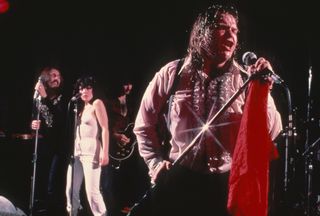
Backstage, Meat was just as intense. There was a reason why he was so larger-than-life. “Meat can eat with the best of them,” Bob Kulick says. “He was a major-league eater. We don’t even want to get into stories like: ‘How many KitKats did Meat eat last night?’. ‘I dunno, I lost count at 25’.”
“When we’d order room service,” Bruce says, “I’d order a hamburger and some French fries and a coke or whatever. With him it was always four or five burgers. He ate like a big guy’s gonna eat. And that was always shocking to me.”
Burgers were easy prey for Meat Loaf. Women, on the other hand, were not as easy to come by, it seems. “He was always frustrated by the girl situation,” Bruce says. “He wasn’t really pulling the chicks, even though he was the star. But look at him. He wasn’t Rod Stewart, you know what I mean?”
By 1978 it was all becoming too much for the band. The Bat Out Of Hell album had sold millions and they’d toured the world, and still there was no end in sight. Jim Steinman wanted to leave the tour and start working on the second Bat… album; the band simply wanted to stop while they still could.
“I remember during the last days, it was like, enough already,” Bruce says. “We did over 200 shows in a year. It was a very extensive tour of the world.”
“Towards the end it got so big you couldn’t even see the audience,” Joe says. “We were playing these gigantic shows. Some of the gigs were 90,000 people. We had a Lear jet and limos on the runway. It was so big it was ridiculous.”
Eventually Meat’s voice began to give out on him.
“The problem with Meat Loaf was that the road was killing him,” Bob says. “His voice really couldn’t handle it. He needed some days off, didn’t get ’em, and of course the worst happened.”
In May 1978 the band played a gig in Ottawa, Canada. Halfway through Paradise By The Dashboard Light, Meat fell off the stage and broke his leg.
“I was playing and not looking at anything, and suddenly there was no vocal,” drummer Joe Stefko remembers. “I look up and Bob is standing there staring at me, and when I looked at him he put his finger across his throat. He said: ‘Stop. It’s over’. I walked over the lip of this really high stage and he was all sprawled out, and his legs were all in really wrong angles. That was the beginning of the end. He broke himself up. We did a make-up gig in New York and he did it in a wheelchair. He did the whole show in a wheelchair except for the last line in Heaven Can Wait, he got up on his feet and the place went fuckin’ crazy. It was like a guy throwing his crutches away because he’s been touched by God or something.”
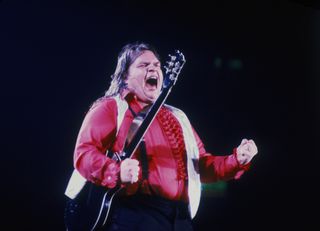
“There were many times when the tour just seemed like a train wreck, but in the world of rock’n’roll a train wreck never seemed to stop anything,” Karla says. “If anything, it only adds to a band’s reputation. The brakes need to be put on, and I think that’s why Meat fell off the stage. I can’t say that for certain, that’s just the way it seemed to me, as a spectator.”
When Classic Rock asked Meat whether it was a conscious decision to fall off the stage, he was incredulous. “You must be nuts!” he said. Still, in his book, he suggests otherwise when discussing the fall: “I think it was my way of taking myself out of the situation. The road, the drugs, the drinking had become intolerable and I had become a monster.”
However it happened, the broken leg effectively killed the monster dead in its tracks. The tour ended shortly after, and Meat, now in the throes of cocaine addiction, finally went over the edge. He had a nervous breakdown, which came to a typically dramatic climax on the ledge of a high-rise building in New York City. While a crowd of police, firefighters, and astonished gawkers watched from the street below, Meat threatened to leap from the building and turn himself into hamburger. Eventually, the band’s road manager, Sam Ellis, talked him down from the building.
“I don’t even remember being on the ledge,” Meat reports in his book.
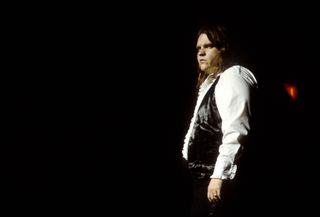
The band went their separate ways. Bruce Kulick eventually joined Kiss. Bob Kulick became a successful studio musician. Joe Stefko and Karla Devito both contributed to Bad For Good, the album that was initially slated as the follow-up to Bat Out Of Hell. But Meat Loaf’s voice didn’t recover in time to sing on the album, so Jim Steinman sang the songs himself and released it under his own name.
A proposed second tour, this time by train and, somewhat amusingly, to be sponsored by McDonalds, fizzled out.
“He never really got up to speed again, ever,” Bob Kulick says. “The opportunity for real greatness was lost. He had another great hit with the subsequent record 20 years later, but it’s just not the same.”
Karla Devito, now a successful actress, looks back at the experience. “I was always amazed at the agility Meat had out there. He did somersaults out there, he was relentless. He never stopped. I feel bad about all the problems and tortures he created for himself. And there’s no doubt that when he started he had the most amazing voice in rock’n’roll, ever. And that went away. There’s no way to perform like that and still keep it. But you’ve gotta give the guy credit. He’s maintained a viable career all these years. It’s amazing. But that first little chunk of time, that perfect moment in the band with him and with Steinman when he was still on the tour, it was really magical.”
And Meat? Well, Meat’s still not talking. But if all Hell couldn’t stop him, it’s probably safe to say you’ll be hearing from him again.
This article originally appeared in Classic Rock 114.
